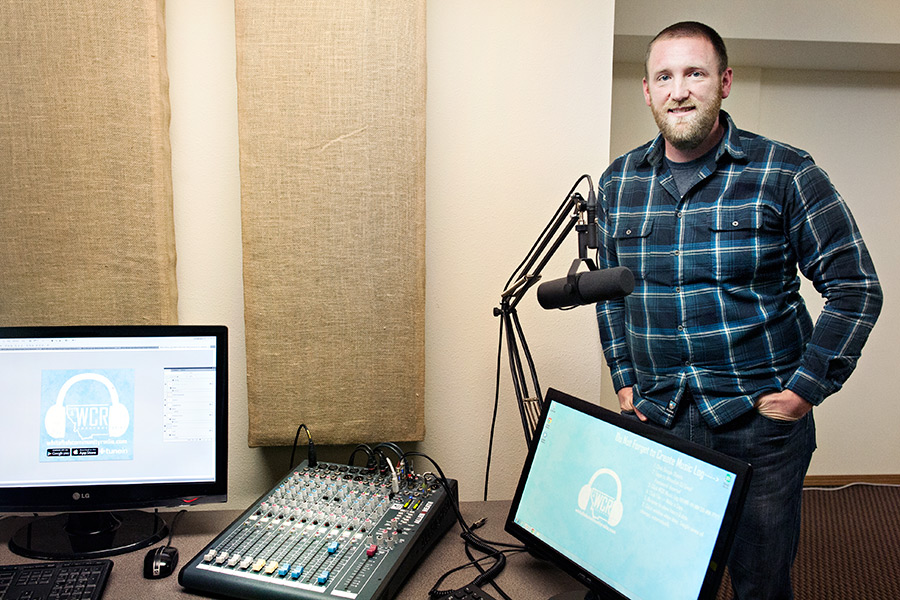WHITEFISH – In his basement studio just off Second Street, Eric Waier can’t see the busy downtown scene outside the walls; his only window shows a glimpse inside the neighboring leathersmith’s workshop.
But Waier is connecting to and communicating with the city around him, through the Internet and his new, nonprofit venture: Whitefish Community Radio.
The radio station is run by volunteers and only available online, but it can serve an important purpose, Waier said. It focuses on micro-local issues, solely dedicated to the people and happenings in Whitefish.
“The Flathead is a great community, because they haven’t really forgotten what community is,” Waier said.
Waier moved to Whitefish in the summer of 2013, after living in various mountain towns in the American West. His technology-based job allowed him to work wherever he wanted, and Whitefish offered a job on the bike patrol during the summers on Big Mountain.
While living in Jackson Hole, Wyoming, Waier got involved with KHOL, a volunteer-based community FM radio station. As opposed to general public radio, the community radio focuses solely on local issues, he said.
“It’s micro-oriented stories,” Waier said.
By August 2014, Waier was convinced by what he’d seen of the Flathead that Whitefish could and would support a community radio service, and started working on his venture.
But when it became apparent he wouldn’t be able to afford an FM license or be able to purchase one from the Federal Communications Commission, Waier turned to the Internet.
Now, Whitefish Community Radio is available online and through its own apps, available for Apple and Android. The shows are all live.
Since the radio is exclusively online, Waier doesn’t have to conform to FCC standards, but he said he uses some of their guidelines to help him with his radio format.
The hours on air are made up of 100 percent local content, including shows from local people looking to share their passions. Whitefish City Manager Chuck Stearns hosts a weekly show, “Beware Dead Air,” on Wednesdays, based on his dedication to all things Grateful Dead.
Stearns has experience on the radio, having spent nine years as a volunteer DJ in Crested Butte, Colorado, and five years at a community radio station in Idaho Springs, Colorado.
His four-hour show starts at 8 p.m., and the first two hours include a wide variety of music for all listeners, Stearns said. But from 10 p.m. to midnight, the Deadheads take over.
“I enjoy it because I’ve got a pretty extensive collection so it gets it out into more of a public domain,” Stearns said. “That’s why I do two hours of variety and two hours of Dead. Dead’s kind of a special genre, but I think people would like the other music that I play as well.”
Stearns “got on the bus” for the Grateful Dead after a 1971 concert in Cleveland, Ohio, when he was 14. His friends’ older brothers talked him into going to the show, where the Hell’s Angels were taking tickets at the door.
That started a lifelong devotion to the band, he said, with more concerts through college in Colorado and afterward.
While he never followed the band on tour like other stalwart fans, Stearns has grown his Grateful Dead collection, so much so that his shows are all historically based. For example, his Jan. 14 show will feature a concert from Jan. 14 in the 1960s.
His show on Whitefish Community Radio allows Stearns to communicate and interact with the city and its residents on a new level.
“Whitefish Community Radio can be a great resource,” Stearns said. “Community radio stations are just a fantastic resource to the community.”
Along with Stearns’ show, listeners can enjoy shows from other locals, including The Old School, which harkens back to rap and hip-hop’s early days; Flashback Fridays, with tunes from the 1970s-1990s; and Saturday Morning Stories and Songs with Gramma J.
Waier hopes to keep the programming educational and musical, with advertisements remaining subtle and of the NPR type. Anyone who feels they could have a show should fill out a form online, he said, which Stearns also encouraged.
“This doesn’t work without the volunteers,” Waier said.
Soon, Waier hopes to have a schedule of diverse programming, and just bought a second microphone for interviews, which will include local musicians who can talk about their music.
The audience has already grown 68 percent from November to December, Waier said, but it is still relatively small. But as more people are accessing music and radio programs on their phones and through Internet connectivity in cars, Waier believes his community radio could catch on.
“To me, this is the future of where radio is going,” he said.
To listen to Whitefish Community Radio, visit www.whitefishcommunityradio.com or download the WCR app.
